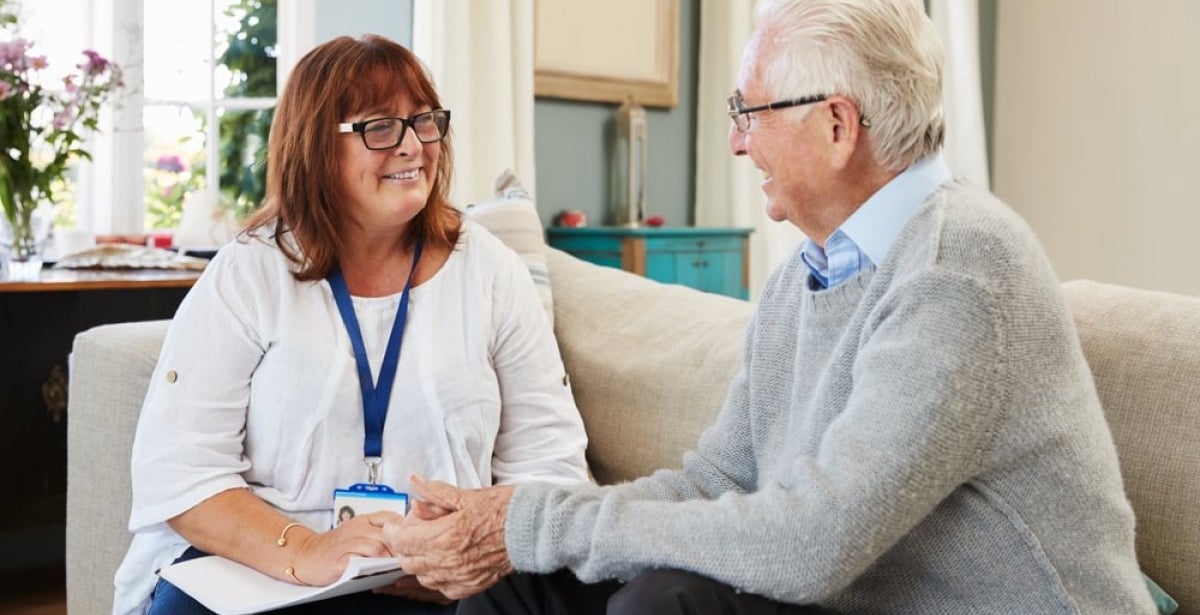
How to improve mental health in elderly adults
At the turn of the century, the average life expectancy in Australia was just over 78 years. By 2020, this had reached 83.5 years, replicating a consistently upward trend.
As Australians get older, the risk of health implications increases, but not just physically – mental health issues in the elderly are just as prominent.
It’s important to understand the signs and symptoms of mental illness in older adults to provide them with the right support and care.
What mental health issues are common in the elderly population?
Often retired after a lifetime of work and free of child-rearing responsibilities, our elderly may appear devoid of stress and anxiety. But this is not always the case; our older generations are not immune from mental health issues.
In fact, it is estimated that between 10-15 per cent of the elderly population suffer from depression and 10 per cent suffer from anxiety. For those living in residential aged-care facilities, that figure is thought to be much higher, at 35 per cent.
However, studies have found that older adults are less likely to access mental health services than other age groups. This may be due to the availability of fewer mental health services for the elderly, or a perceived stigma around mental health issues for this age group. It may also be that older people see mental health issues as a normal part of ageing and, as such, don’t seek help or support.
Mental health risk factors in the elderly
There are a number of possible risk factors or causes of anxiety and depression in the elderly. Dealing with chronic pain or illness can be challenging and side effects from some medications may play a role in compounding mental health problems. Another possible trigger may be moving into an aged care setting.
Financial stress and loss of independence are also commonly associated with mental health issues in elderly adults.
Associate Professor Christopher Fisher is the Academic Course Coordinator and Director of Teaching & Learning at Victoria University (VU) Online for the College of Health and Biomedicine.
With a background in public health, Dr Fisher is an experienced mental health professional who has witnessed the impacts of the COVID pandemic on our older generations.
According to Dr Fisher, for adults in the 50- to 65-year-old range, job discrimination is another possible cause of mental health concerns.
“For these people, they are not quite at an age where they are ready to retire. But they are finding it difficult to find work as they are being overlooked for younger people. They are worried about how they are going to make a living and a living that isn’t half of what they have previously been earning.”
COVID’s impact on mental health issues in the elderly
There has been much talk of the impact of COVID lockdowns on mental health in early childhood. But research also suggests that mental health issues in elderly adults were more common throughout the lockdowns.
One study found that one in five people (aged between 60-87) suffered from anxiety or psychological distress during lockdown periods.
Dr Fisher says that this may be because of the lack of social and familial interactions.
“We are social beings and to have that stripped away from us can be really tough. Not even being able to go out and socialise with friends can be really challenging for people. We have seen upticks in things like depression in the elderly.”
What does mental illness in older adults look like?
Mental illness can manifest differently in older adults than it does in teenagers, adolescents or young adults. Add to this the reduced propensity of the elderly to seek help and it can be easy to miss. Not to mention that many older people may believe that what they are feeling is normal. As they grow old, they will come to expect this as part of the ageing experience.
Of course, depression and anxiety aren’t a normal part of getting older. And the difficulty is that this is how many of the symptoms are perceived.
Symptoms like insomnia, difficulties with concentration or memory, and social withdrawal are brushed aside as things that happen to old people. But they could be a sign that something more serious is going on.
Other common symptoms of mental illness in the elderly may include:
- Feelings of irritability, sadness or worthlessness
- Difficulty sleeping or sleeping more than usual
- Lack of interest in activities they usually enjoy
- Social withdrawal from family and friends
- Physical symptoms, such as lack of energy, headaches, nausea or other forms of pain
- Indecisiveness, confusion, agitation or excessive worrying
- Loss of appetite
This is not about having an off day. If a person has been displaying these symptoms for two weeks or more, it is worth speaking with a mental health professional.
How to improve mental health in elderly adults
So, what can be done? If older people are less likely to seek help and the symptoms aren’t as easy to identify as for other age groups, how can you help? How can we address mental health issues in the elderly in an impactful way?
Dr Fisher shares two different ways you can make a difference for the elderly – both personally and professionally.
Make a personal difference by reaching out
Everyone has a personal network. Dr Fisher suggests that one thing you can do from a personal perspective is to reach out to the older people in your life.
“If an older person is feeling lonely and isolated, even just a phone call can mean a lot to them. It can make a big difference to how they feel by simply having that social connection.”
More than just a phone call, if you can arrange to visit the person, this will also be a helpful action that you can take.
If you do suspect an older person in your life is suffering from anxiety and depression, you could offer to talk to them about it. They may be reluctant to do so, but it is also worth suggesting that they speak to their doctor or a mental health nurse.
Make a professional difference by upskilling
If improving mental health in elderly adults is a passion of yours and you really want to make a difference, Dr Fisher encourages you to consider joining the industry.
“Working in the industry, you can really make a difference for people beyond your own circle.
“VU Online offers a range of postgraduate mental health courses online in Australia. Through these, you can learn how to become a mental health worker. If you already have health experience, these courses – such as the online Master of Mental Health – will help you become familiar with the language of the industry. You can start to make connections and learn from experts from around the country.”
VU Online’s postgraduate Block Model is an innovative approach that helps you focus on a single unit at a time. This limits the amount of juggling you need to do and is an approach that our students appreciate.
“Lifelong learning is very satisfying,” says Dr Fisher. “As you’re building your knowledge and connections through the course, you can start to think about where you fit in. Where are you best placed to help address these issues that elderly people are facing?”
Grow your skills and drive positive impact with VU Online
There is no denying that there are many mental health challenges for our elderly populations. Older people will benefit from the right people in the industry advocating for change.
If you can picture yourself driving change in the mental health industry to support older adults, learn more about the online Master of Mental Health.



